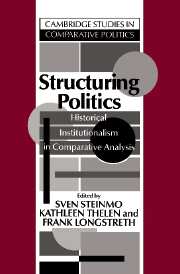Book contents
- Frontmatter
- Contents
- Preface
- List of contributors
- 1 Historical institutionalism in comparative politics
- 2 Labor-market institutions and working-class strength
- 3 The rules of the game: The logic of health policy-making in France, Switzerland, and Sweden
- 4 The movement from Keynesianism to monetarism: Institutional analysis and British economic policy in the 1970s
- 5 Political structure, state policy, and industrial change: Early railroad policy in the United States and Prussia
- 6 Institutions and political change: Working-class formation in England and the United States, 1820–1896
- 7 Ideas and the politics of bounded innovation
- 8 The establishment of work–welfare programs in the United States and Britain: Politics, ideas, and institutions
- Index
6 - Institutions and political change: Working-class formation in England and the United States, 1820–1896
Published online by Cambridge University Press: 04 August 2010
- Frontmatter
- Contents
- Preface
- List of contributors
- 1 Historical institutionalism in comparative politics
- 2 Labor-market institutions and working-class strength
- 3 The rules of the game: The logic of health policy-making in France, Switzerland, and Sweden
- 4 The movement from Keynesianism to monetarism: Institutional analysis and British economic policy in the 1970s
- 5 Political structure, state policy, and industrial change: Early railroad policy in the United States and Prussia
- 6 Institutions and political change: Working-class formation in England and the United States, 1820–1896
- 7 Ideas and the politics of bounded innovation
- 8 The establishment of work–welfare programs in the United States and Britain: Politics, ideas, and institutions
- Index
Summary
THE PUZZLE
For the past century, English and American labor unions have adopted quite different strategies for advocating workers' interests and as a consequence have played very different roles in their respective political economies. In England the principal national labor organization, the Trades Union Congress (TUC), generally has looked to party and electoral politics as the cornerstone of its strategy; by forging strong ties with the Labour Party in the first two decades of the twentieth century, English unions have infused political debate with work-related issues and have advanced an extensive program of social reform. In contrast the American Federation of Labor (AFL) pursued a different strategy known as business unionism or voluntarism, in which workers' concerns were secured primarily through collective bargaining and industrial action on the shop floor. At the high point of voluntarism, in the early decades of the twentieth century, the AFL largely eschewed political reform and adhered instead to a policy of nonpartisanship and political independence, even to the extent of opposing a wide range of government-sponsored social policies such as old age pensions, minimum wage and maximum hours laws, and compulsory health and unemployment insurance.
To be sure, even in the golden era of AFL voluntarism American labor never withdrew from politics entirely. The AFL always maintained some contact with the Democratic Party, and continued to play a limited role in electoral politics.
- Type
- Chapter
- Information
- Structuring PoliticsHistorical Institutionalism in Comparative Analysis, pp. 155 - 187Publisher: Cambridge University PressPrint publication year: 1992
- 9
- Cited by



